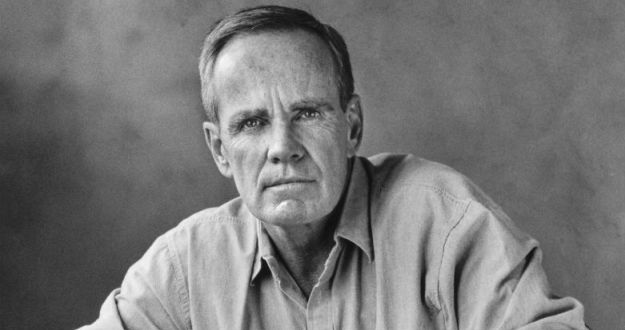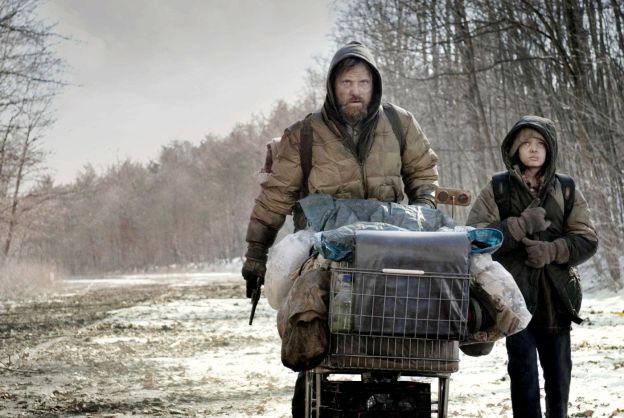
“He pushed the cart and both he and the boy carried knapsacks. In the knapsacks were essential things in case they had to abandon the cart and make a run for it. Clamped to the handle of the cart was a chrome motorcycle mirror that he used to watch the road behind them. He shifted the pack higher on his shoulders and looked out over the wasted country. The road was empty. Below in the little valley the still grey serpentine of a river. Motionless and precise. Along the shore a burden of dead reeds. Are you okay? He said. The boy nodded. They set out along the blacktop in the gunmetal light, shuffling through the ash, each the other’s world entire.”
“I pushed the cart and I and the boy carried knapsacks. In the knapsacks were essential things in case we had to abandon the cart and make a run for it. Clamped to the handle of the cart was a chrome motorcycle mirror that I used to watch the road behind us.”
“You pushed the cart and both you and I carried knapsacks. In the knapsacks were essential things in case we had to abandon the cart and make a run for it. Clamped to the handle of the cart was a chrome motorcycle mirror that you used to watch the road behind them. You shifted the pack higher…….”
An omniscient narrator tells the story of The Boy and The Man in The Road, which is in the third person and mostly from the point of view of the father. However, towards the end when the father is dying, McCarthy writes passages through the boy’s eyes. Once the father dies, the book’s perspective switches to his son. Consequently, the point of view is unreliable and telling the majority of the story from the father’s point of view makes their situation, perhaps, bleaker than it may actually be. Why would this be the case? The boy’s emotional response and perspective are likely to be different because he was born later and so does not have his father’s background and misfortunes (his wife killing herself). He has entered the story after his father and like all of us will see the world differently depending on upbringing and circumstance. The boy’s view, however, is likely to be limited by his vocabulary and we may feel that we are missing the depth provided by an adult’s perspective. They are however in the author’s words “each other’s world entire” It would appear to me that it is difficult to separate the thoughts as each is influenced by the other as is found in any close relationship.
The boy is actually quite a positive and emotional person, but with the focus on the father, the boy comes across as overly sensitive and unhelpful to their struggle for survival, he misses his mother and seeks re-assurance about the fire. In comparison, the father initially comes across as the strong, self-sacrificing figure, battling against the elements. He finds the food, builds the shelters and decides the direction to go in. When the father dies, the readers’ understanding of the novel and the father’s character changes. The boy immediately meets someone else, who takes over the role of the father.
He [The Man] woke in the morning and turned over in the blanket and looked down the road through the trees the way they’d come in time to see the marchers four abreast. Dressed in clothing of every description, all wearing red scarves at their necks. Red or orange, as close to red as they could find. He put his hand on the boy’s head. Shh, he said. (141.1)
The first sentence describes The Man waking up, then the narration pretty clearly shifts to what The Man is seeing and thinking. It doesn’t read, “The man saw the road agents dressed in clothing of every description…” but rather, “Dressed in clothing of every description.” It’s more immediate, and we forget The Man is seeing all this – we simply see it through his eyes.
The third person omniscient narration allows McCarthy a good deal of freedom, as he is not constrained by each character’s thoughts and motivation, it allows him a tool to explore a broad sweep of the landscape and events. He can move from one character to another, to more objective descriptions of a setting, and to lyric descriptions, no one but an author would think or write. “the still grey serpentine of a river” ” a burden of dead reeds”
He rose and stood tottering in that cold autistic dark with his arms outheld for balance while the vestibular calculations in his skull cranked out their reckonings. An old chronicle. To seek out the upright. No fall but preceded by a declination. He took great marching steps into the nothingness, counting them against his return. Eyes closed, arms oaring. Upright to what? Something nameless in the night, lode or matrix. To which he and the stars were common satellite. Like the great pendulum in its rotunda scribing through the long day movements of the universe of which you may say it knows nothing and yet know it must. (19.1)
“The way McCarthy sails close to the prose of late Beckett is also remarkable; the novel proceeds in Beckett-like, varied paragraphs. They are unlikely relatives, these two artists in old age, cornered by bleak experience and the rich limits of an English pulverised down through despair to a pleasingly wry perfection.” https://www.theguardian.com/books/2006/nov/04/featuresreviews.guardianreview4
People don’t usually call the dark “autistic,” and words like “vestibular,” “reckonings,” “lode,” and “rotunda” are not used very often either. Because of the rarity of these words and the odd, archaic syntax McCarthy sometimes uses (e.g. “To which he and the stars were common satellite”), these passages have something of a muscular, lost beauty, everywhere the mummified dead, “shrivelled and drawn like latterday bogfolk, their faces of boiled sheeting, the yellowed palings of their teeth”.
It gives an effect of watching the characters development intently, but still allows you to tolerate such a bleak story, the effect of being raw but just enough edge taken off to keep reading.
The story is closing related to place – is it salvation they are heading to, the land is described as bleak and apocalyptical so there is a real sense of the place as deserted, where are the people what happened here and where are we? There is also a sense of time with the journey and the days and nights described but we are still left wondering when this took place in the past or in the future. The film places it in America in the near future.
The trout in the last paragraph of the novel, an uplifting image, helps emphasise the beauty of memory despite loss. It also puts into relief all the lyrical descriptions throughout the book. By placing such an image in the last paragraph, McCarthy adds a little importance to all the lyrical descriptions that are throughout the text. Just imagine if McCarthy had ended the book with another gory image; the novel would seem less humane. It would have ended on a note of warning and despair. Thankfully, this is not the case, the ending of the novel is surprisingly hopeful. After 200-odd pages of gore and wandering, and after The Man dies, leaving The Boy all alone, some kind souls take in The Boy. Throughout the whole book, The Man and The Boy have been on the lookout for the “good guys” but they never seem to find them. That is, until the last few pages, when The Boy finds them. The trout are “of a thing which could not be put back. Not be made right again.” but where they lived “all things were older than man and they hummed of mystery”.

